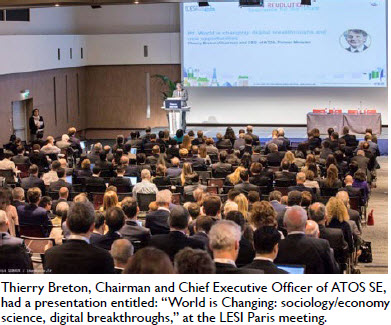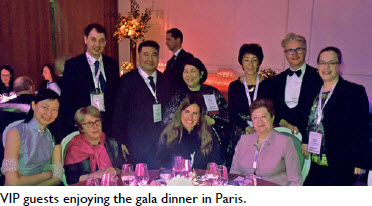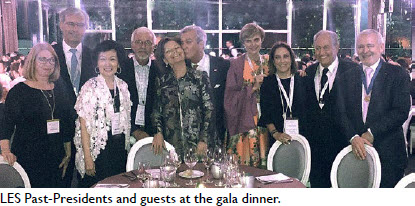By Jan Dohnal, Law Student, Masaryk University, Czech Republic
 IP Revolution Congress organized by the Licensing Executives Society International (LESI) took place 23–25 April in Paris. I am a law student from the Czech Republic and I obtained a unique opportunity to participate in this LESI Annual Congress. After a few hours spent at the Paris Novotel Centre Tour Eiffel, I realized that LESI events are on the one side very professional but on the other side also endowed with a family mood. Participants mostly knew each other and it was a great occasion to meet each other again.
IP Revolution Congress organized by the Licensing Executives Society International (LESI) took place 23–25 April in Paris. I am a law student from the Czech Republic and I obtained a unique opportunity to participate in this LESI Annual Congress. After a few hours spent at the Paris Novotel Centre Tour Eiffel, I realized that LESI events are on the one side very professional but on the other side also endowed with a family mood. Participants mostly knew each other and it was a great occasion to meet each other again.
The opening speech was made by Patricia Bunye (immediate Past-President, LESI) and Anne Charlotte Le Bihan (LES France). Patricia Bunye highlighted the significance and irreplaceability of these face-to-face meetings. Anne Charlotte Le Bihan explained why the IP Revolution topic was chosen for this year’s Annual Congress. They wanted to bring a topic which is really needed and appreciated by its members. The growing importance of intellectual property rights also contributed. LESI introduced a very carefully prepared and rich program full of outstanding speakers.
The panel was then followed by keynote speaker Thierry Breton from ATOS. He pointed out very interesting data. He mentioned that we will produce more than 40 ZB of data by 2020—a totally unimaginable quantity. This figure should double every two years, according to assumptions. If we put this data on CDs, the CDs stacked on itself would create a column six times longer than the distance between the Earth and Moon, quite impressive information—this fact was later added by Adrien Basdevant who chaired the Big Data workshop. We live in a time of digital and information revolution, when mobility and social media are the two key words. These days, there are over 1.86 billion monthly active Facebook users in the world, which is a 17 percent increase year-over-year. There are 1.15 billion mobile daily active users for December 2016, an increase of 23 percent year-over-year. (Source of both statistics: Facebook as of 2/01/17). Mr. Breton also made an instructive statement for all of us, “Keep your data and take care about it. Do not allow somebody else to process it for you.” It seems that Big Data processing has a huge business potential. Many times, I heard that data is the new gold. With all the above-mentioned, the important question of data security comes. We always have to think about data security and adequately take care of it. Even though it can be associated with high extra costs.
Artificial Intelligence (AI) is one of the hottest topics concerning IP now. This issue was very well covered. AI is driving our economy and society into a new era of innovation. Why can we talk about AI now? Text analysis are so well developed that it allows deep machine learning. We are also able to deal with Big Data thanks to advanced computing power (GPU). The need to adopt new legislation on Artificial Intelligence has been debated.
Participants could choose between particular workshops according to their interests. The “Big Data, Big Business?” workshop was one of the most interesting for me. The panel was composed of the following speakers: Carina Namih, Maximilian Von Graffenstein, François-Xavier Rousselot and panel chair Adrien Basdevat. When we will be able to fully exploit the potential of Big Data and AI, a new technological revolution is likely to take place. Machines will write the software algorithms. Business activities will be in the hands of program. Big Data helps to improve targeted advertising that is being used intensively today. For high-quality targeted prediction, a lot of data is needed. What is the biggest problem here—an ownership? The open question remains, who will be the data owner produced by AI in terms of property rights, because more than one stakeholder is involved. Definitely an interesting thought is the potential use of AI in court decisions.
The entire European Union is now experiencing an upcoming amendment on data protection—The General Data Protection Regulation (GDPR)—Regulation (EU) 2016/679. I believe there is no doubt that this topic has also been discussed. It was adopted on 27 April 2016. It applies from 25 May 2018 after a two-year transition period and, unlike a directive, it does not require any enabling legislation to be passed by national governments. This EU regulation brings quite a few changes. One of the major changes—higher penalties for non-compliance. It could be massive—up to 4 percent of total global annual turnover or €20 million. It is very innovative. One of the most important goals is to achieve greater transparency when dealing with personal data (which refers to a person or which identify a person). In the future, there will be much more data about our position, how long we spend on social networks, watching TV, or reading the Kindle. People are not aware of the fact that this data is widely used. They are sold and serve as a psychological profiling of people that can help merchants specifically target their customers. “We should help people to understand and communicate this issue” as was mentioned by Carina Namih.
I would like to also highlight that IP arbitration, which was provided by WIPO Arbitration and Mediation Center, was presented. I was deeply impressed by the presentation of Roch Drozdowski-Strehl (REIDS) who showed us the futuristic project—the Singaporean construction of an artificial island made of waste, where modern technologies for renewable energy are being tested. Very creative franchising methods were introduced by Mark Abell from Bird & Bird. A fascinating project was presented by Yves Le Henaff (Kawantech) on how to adapt public lighting in real time for users’ needs. The public lighting system can serve as a data collector for identifying a free parking spot or another necessary sensor for autonomous vehicles. For example, it can notify the autonomous vehicle that there is an approaching child behind parked vehicles. Of course, there are many legal privacy issues connected. This is one way to make smart cities even smarter. The improving technology helps the environment and reduces the use of precious energy.
Normally I am used to attending events full of lawyers. This time it was different. I also met people from other branches like economists and business people, what I consider to be a pleasant variety.
It was not just about the learning. During the evening, we enjoyed a very pleasant Gala Dinner at Pavillon d’Armenonville, tasted a real French Champagne and danced until the early morning hours. The conference was concluded with a “wine and cheese” reception. These social events were awesome chances to network and meet new friends and international colleagues.
To sum up, it was my pleasure to attend this very well organized event, learn the latest trends in the IP field and meet my international colleagues.
Memorable Quotes From Paris
Patricia Bunye—
– “delivering what our members need”
Anne-Charlotte Le Bihan—
– “outstanding speakers”
Thierry Breton—
– “take care of your data”
– “somebody knows already what to do with your data”
Inventive Enterprises
Brian Hinman, Philips—
– “you have to think outside the box as a company”
Jean-Yves Legendre, L’Oréal—
– “sustainable development will make the difference between companies which will survive and those which will not”
– “everybody is responsible for innovation”
Business and Academia Partnership
Nicolas Carboni, SATT—
– “an industrial question can become an academic challenge”
Jacques Lewiner—
– “do not forget basic research”
– “let people take risks”
– “that is why small companies are better than big ones”
– “Bluetooth resulted from Wi-Fi”
– “I very strongly advise people who create startups to build a patent portfolio”
Software Licensing
Keith Bergelt, Open Innovation Network—
– “instead of thinking about what could be, we tend to think about what is.”


